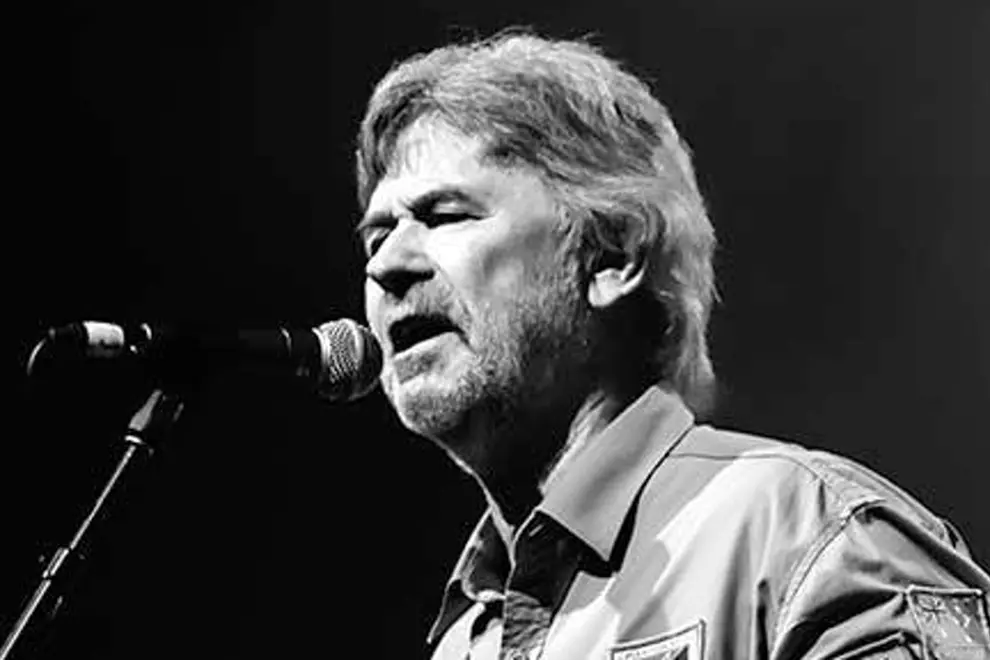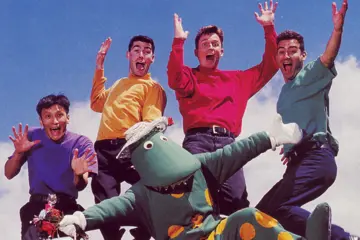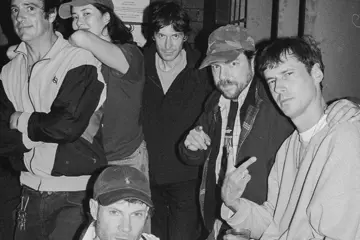Forty years ago this month, John Schumann was backpacking through Indonesia with his new wife, Denny. It marked a fresh start for the singer. After seven years fronting Adelaide band Redgum, he believed their new live album would be their swansong. When he got home, Schumann planned to return to teaching.
The honeymooners dropped into the local post office when they arrived in Jakarta, hoping to find a card from home. Instead, they were greeted by a deluge of telegrams. They sat in the gutter outside the post office, trying to make sense of them all.
“It’s number 5 … It’s number 8 … You must come home! … It’s number 1 … It’s number 20 …”
When they put the telegrams in date order, everything made sense: I Was Only 19 – the song that Schumann had written six months before – had knocked off Michael Jackson’s Billie Jean to top the Australian charts.
The band and their record company wanted Schumann to fly home to do a tour and promote the record, but the singer had other ideas. “Hang on a sec,” he thought, “the band broke up. And none of you bastards wanted to record the song anyway, so I’m staying on my honeymoon, and when we get home, we get home.”
Don't miss a beat with our FREE daily newsletter
Schumann did agree to the record company’s request to check into a hotel at their next stop, in Jogja, and do a few days of phone interviews with journalists and radio stations eager to find out more about Australia’s new chart-topper. After the record company picked up the bill for their 5-star accommodation, Schumann and his wife returned to their $4-a-night backpacker digs.
In Ubud, a fellow traveller spotted them. “Hey, are you John Schumann? You’ve got a number-one song back at home!”
“Yeah, yeah,” the singer replied. “I’ll get back to that in a few weeks.”
The remarkable story of this song started when Schumann was living in Melbourne, on Station Street, North Carlton. When he went home to Adelaide to spend some time with Denny, he had a night on the beers with her brother, Mick, who had served in Vietnam. As Mick recounted his experiences, Denny – a historian – suggested that Schumann should record the conversation.
When Redgum returned to the road, Schumann took the tapes with him. “While the rest of the band was listening to the Eagles and Kevin Bloody Wilson – we were big fans of Kev Wilson in Redgum – I was listening to this conversation with Mick on my Walkman,” Schumann recalls. “I had no idea what to do with it.”
Then in November 1982, after a gig in Gippsland the night before, Schumann sat down in the backyard of his North Carlton home, with his guitar, a cup of coffee, a pack of smokes, a foolscap pad and a red biro.
And the song – Mick’s story – poured out of him.
Mick was happy for his soon-to-be brother-in-law to write the song, but he set two conditions. Firstly, “I don’t want you to put shit on my mates.”
“I understood where he was coming from,” Schumann reflects, “because, at that particular point in time, Vietnam veterans were not exactly the returned heroes our fathers were from the Second World War.”
And the other condition? Mick had the right to veto if he didn’t like the song.
When he heard it, Mick said simply: “Oh yeah, I think you got it. But you better go and see Frankie.”
Redgum were playing in Tathra on their Sandals In The Wind summer tour. Frankie lived just up the road, in Bega, so Schumann drove to see him. “Because I was a mate of Mick’s, that got me in the door, but I don’t think he was initially keen to welcome me – a left-wing firebrand with long hair and a beard.”
But Frankie’s attitude changed when Schumann played him the song. “This is really important,” Frankie said. “And it’s really going to help the veterans’ movement.”
Several years later, Schumann was invited to do a guest lecture at his old university, Flinders University, in Adelaide. The professor introduced the songwriter: “What you need to know about this guy, why his work is so influential, is he gets the detail right … the detail is a signpost to the meaning.”
But Schumann did change a couple of key details in arguably the song’s most memorable line:
"Frankie kicked a mine the day that mankind kicked the moon/ God help me, he was going home in June."
Lunar trainspotters noted that the line was chronologically impossible – the moon landing was on July 20, 1969.
“I took a bit of poetic licence,” Schumann admits. “It was a little bit for the rhyme, but what I was trying to intimate was that Frankie was meant to have gone home in June and his departure was delayed, though that wasn’t true.”
Schumann reveals another motivation – “a perverse desire on my part”.
“Because I don’t write songs about love and bullshit, I wanted to see if I could write a song that rhymed Moon and June and get away with it.”
The songwriter also changed another key detail. “The fact is Frankie didn’t kick the mine,” he reveals. “Though he might as well have because he was standing right next to it when Skipper Hines stepped on the mine.”
Skipper Hines, Mick and Frankie’s platoon leader, was killed and Frankie was badly wounded.
“Everyone at the time was very keen to protect Skipper’s family from having to revisit the trauma, so with Frankie’s agreement, we fitted him up with stepping on the mine.”
The song arrived at a difficult time for Redgum. They had not enjoyed making their third album, Brown Rice & Kerosine – “it was just too slick, it was wrong for Redgum” – and they had to do a long tour to pay off their recording debt.
After getting Mick and Frankie’s approval, Schumann played the song for the band.
They didn’t like it.
The night after the Tathra gig, Redgum were playing in Batemans Bay. There was a knock on Schumann’s motel door. The rest of the band had decided they didn’t want to release I Was Only 19 as a single. Schumann had written their recent singles; they hadn’t worked, so they wanted to try something different.
Annoyed that the band had met without him, Schumann informed his bandmates that he’d do the song without them. Only Redgum’s Hugh McDonald appeared on the recording, alongside a bunch of session musicians, including Goanna bass player Peter “Brolga” Coughlan, and drummer Brian Czempinski, who later joined the band.
Schumann took the song to CBS, playing it for the managing director, an American named Bob Jamieson, and the general manager, Denis Handlin. They both loved the song.
“That’s amazing,” Jamieson said. “What do you want to do with it?”
Schumann explained he wanted to release it as a single and give the artist royalties to the Vietnam Veterans Association (a gesture that raised more than $70,000).
“That’s fantastic,” said Jamieson, who had one more question: “What’s the song called?”
“A Walk In The Light Green.”
“Nah,” the record company boss replied. “You have to call it I Was Only 19.”
Schumann was resistant to changing the title – “a walk in the light green” is how the soldiers referred to patrolling a dangerous area where there was little cover and the likelihood of land mines – but he reluctantly agreed. The song was released as I Was Only 19 (A Walk In The Light Green).
Schumann did, however, refuse the US record company’s request to “Americanise” the song.
When it topped the Australian charts, CBS was keen to release the song in the US – if Schumann changed the words for an American audience. The songwriter said, “Yeah, nah.”
“And then I sang the Angels song, ‘No way, get fucked, fuck off!’
“My position was, look, we have been existing on a diet of American cultural bullshit for our entire lives … what is wrong with the Americans being exposed to Townsville, Nui Dat and Puckapunyal?
“Fuck ’em. I jacked up.”
Four decades on, Schumann doesn’t regret his decision. “It just would have been wrong; it would have been commercialising what had already become a sacred song for the Vietnam veterans.”
In a year of unlikely local hits – 1983’s biggest single was Austen Tayshus’ spoken-word piece Australiana – I Was Only 19 stood out as it rose to the top of the charts without the support of the then dominant TV show Countdown.
Before Midnight Oil’s famous boycott, Redgum also refused to appear on the top-rating show.
“When we signed with CBS and did our second album, the record company told us they’d have a crack at getting us on Countdown,” Schumann explains. “We told them we’d think about doing the show, but we wouldn’t mime, and we wouldn’t perform in front of the flashing Countdown sign.”
It was a stand-off with the Countdown producers. Then word came back from the show: We don’t want the band, they’re too left-wing, and we don’t like his voice.
Far from being upset, Schumann’s reaction was, “Fucking great, that’s terrific.”
“I flipped it – rather than us whingeing because they wouldn’t have us on the show, I said: ‘Let’s put out a statement saying we refuse to go on Countdown.’
“I had no idea what I was doing, it was just instinctive, but it was a brilliant marketing move, and it really cemented our cred with our fans.”
Redgum even wrote The Countdown Song – set to the tune of April Sun In Cuba – which sent up the show and became a highlight of their live set, complete with the band and crowd waving their hands in the air like the Countdown audience.
Schumann even refused to allow Countdown to air the band’s low-budget I Was Only 19 video. “I refused permission as our clip featured me, and my position was that we were not to appear on Countdown either live or on film.” The show cut its own clip – without featuring Schumann.
[Redgum rescinded their Countdown ban after Schumann exited the band in 1986, appearing on the show to sing their safe-sex anthem Roll It On Robbie, sung by Hugh McDonald, the father of Camp Cope singer Georgia Maq.]
APRA declared I Was Only 19 one of the Top 30 Australian songs of all time and in 2015 it was added to the National Film & Sound Archive’s Sounds of Australia Registry.
But it’s the approval of the Vietnam veterans that matters most to Schumann. They embraced I Was Only 19 because it was Mick’s story. It was Frankie’s story. It was their story. It was the detail.
Of course, Khe Sanh is the other famous Australian anthem about the Vietnam War. Sydney songwriter Adam Gibson praised the song but questioned its authenticity in The Aerial Maps’ The Things That Make You Happy: “Well, it’s a bloody long time since bloody Long Tan, and our sappers were never at Khe Sanh, that was a Yanks-only affair,” Gibson stated. “We were mostly down south, bugger all up there.”
The subject of Chisel’s song “Left my heart to the sappers' ’round Khe Sanh”, but the 1968 battle was fought between US Marines and the North Vietnamese. Aussie sappers were not officially involved (though the RAAF provided air support). Gibson did, however, add: “But I’ll give Don Walker his due … it meant a lot, and he was right to say that there was no V-Day heroes in 1973.”
“19 resonated with the Vietnam vets,” Schumann says, “because they heard it and they knew it was true.”
Schumann is also proud of the song’s chart success. “I think we demonstrated to an albeit unwilling and resistant music industry that there was a market for political songs and stories told in our accent and placed in our geographical context.”
Several acts have covered 19, including Lee Kernaghan, John Williamson and Julia Stone.
Hip-hop band The Herd did their version in 2005, landing at number 18 in triple j’s Hottest 100.
“I think the one I liked best was The Herd’s version,” Schumann says. “I loved what they did with the song and they were very respectful. I even did a few gigs with them.”
Schumann has played I Was Only 19 for Aussie troops in Afghanistan, East Timor and the Solomon Islands, as well as in Vietnam for the 40th anniversary of the Battle of Long Tan.
He is now working on a new version of the song, with The Waifs and producer Shane Nicholson, to mark its 40th anniversary. “I’m very excited about that collaboration.”
Augie March’s Glenn Richards has also done a new version to raise money for this year’s Anzac Appeal.
In 2015, the Chief of the Army, Lieutenant General David Morrison, commissioned Schumann to write a song about the Indigenous soldiers who served in the Australian Army. He wrote On Every Anzac Day and recorded the song with Shane Howard, Rob Hirst and Hugh McDonald (one of McDonald’s final recordings; he died the following year).
Four years after I Was Only 19 was released, Australia’s Vietnam veterans finally got a welcome home parade.
Forty years after 19, John Schumann is still passionate about telling Australian stories. He has embraced the Redgum catalogue, playing their songs with his band, The Vagabond Crew. He says the show, The Redgum Years, is “a tribute to Redgum rather than us pretending to be Redgum”.
He has also brought his acclaimed Lawson album to the stage in Lawson – A Life in Words and Music, which tells the story of Henry Lawson.
“You do these things because you believe in them,” Schumann says. “You have a commitment to Australian culture and literature, and you don’t want it to die.
“Around the watercooler, we can tell each other who got kicked off The Voice or My Kitchen Rules or some other bullshit, but most of us can’t distinguish the work of our foremost poets.”
As the uni lecturer said, it’s the detail. The detail matters.
“When you think about I Was Only 19,” Schumann concludes, “it helped bring Australian Vietnam veterans home. The government gets us into a shit fight and they send young men and women to war. You might disagree with the decision, but I think Vietnam taught us that we need to respect and support the men and women who get sent.
“And I think 19 did that.”
John Schumann’s upcoming tour dates can be found at schumann.com.au.
















